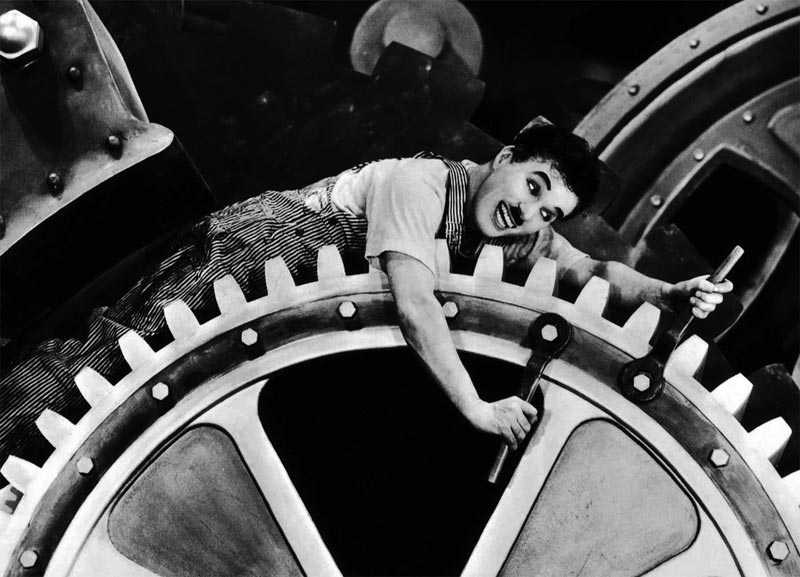The 5 February 1936 comes out in cinemas around the world Modern Times by Charlie Chaplin. It is the most important film produced by actor: is the first to Chaplin's sound and is the first feature film "engaged". Prior 1936, the public was accustomed to see short shorts with simple gag in which, through the character the tramp, stood out the genius and skill of the actor. You do not require any kind of mental commitment to the Viewer, which had to sit and wait for the first comic scene to start laughing. But the world in the 1920s and 30s was changing and Chaplin followed the world: nationalism and the winds of war derived therefrom, changes in society and the mechanization of the industrial sector were phenomena that were not indifferent to the plaintiff. After getting everything a comic actor could conquer: money, honor, Fame, Gloria, Chaplin had arrived the moment to get back in the game, This time putting foot into society and representing it. The modern factory not attributed more to man a prominent place in the productive cycle, the workman had become a part of that assembly line that made it possible to increase the production cycles by reducing production time. The modern factory worker would have to make the same "mechanics" gestures for several hours during the day. What then remained of man, his thinking being and living, of his feelings, passions, of his intelligence? According To Chaplin, nothing. From this concept part the representation of modern society, of those modern themes that carried Yes a progress, a form of evolution of society: the first cars, the first electric company, the first seats, the radios, but all this was obtained at what price? He was the man to be decommissioned and in favor of the machine, which became the main element. Achieve Modern Times it cost a lot to Chaplin, especially the fact that entering feet together in this society, considered distorted, wouldn't be without its criticisms in retrospect. Create laughter with a gag comedienne not engaged or create laughter highlighting how a worker is treated are two things are very different. The evolution also went into the movie business and Chaplin tried to resist her, in fact he wanted Modern Times It was entirely sound. The actor still resists the use of dialogues, but introduces the sound: the music is synchronized with the movement of the characters and conduct of actions. Also had the issue of giving voice to Charlot, as audiences around the world wondered what voice would have had, How would speak. The voice would match the figure of "tramp". Chaplin dares, for a single ciak, the dance of Titina, the actor does sing Charlot, It was one of the most important bets won by Chaplin. All this could not be enough to complete a film engaged, different from previous ones, He also had to change, or rather mature the same character of Charlot: If the first "tramp" could generate sympathy and tenderness into the public, the new Charlot mature as a man: now it is the worker who every day trying to survive and which reflects the working class around the world. Will be with The Great Dictator the character of the tramp will reach full maturity. The final scene of Modern Times where Chaplin calls on the young girl, Paulette Godard his future wife, smile to life is one of the most beautiful films ever made. The smile of the tramp is a hymn to life, love and happiness.
You always criticize, speak ill of you and it will be difficult dating someone to whom you can be fine as you are. Then: live like you think. Do what your heart tells you: what you want. The life is a’Opera of theater that has initial trials. Then: sings, RIDI, Bale, love and live intensely every now of your life, before the curtain drops and l’Opera finish without applause. (CIT. Chaplin)
Roberto Rossetti
